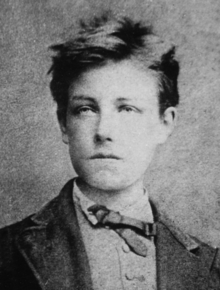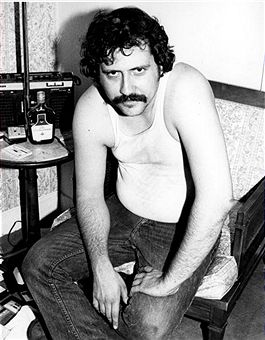
Leslie Conway "Lester" Bangs was an American music journalist and critic. He wrote for Creem and Rolling Stone magazines and was also a performing musician. The music critic Jim DeRogatis called him "America's greatest rock critic".

Horses is the debut studio album by American musician Patti Smith. It was released by Arista Records on November 10, 1975. A fixture of the mid-1970s underground rock music scene in New York City, Smith signed to Arista in April 1975 and recorded Horses with her band at Electric Lady Studios that September. She enlisted former Velvet Underground member John Cale to produce the album. With Horses, Smith drew upon her backgrounds in rock music and poetry, aiming to create an album combining both forms.
Punk rock is a music genre that emerged in the mid-1970s. Rooted in 1950s rock and roll and 1960s garage rock, punk bands rejected the corporate nature of mainstream 1970s rock music. They typically produced short, fast-paced songs with hard-edged melodies and singing styles with stripped-down instrumentation. Lyricism in punk typically revolves around anti-establishment and anti-authoritarian themes. Punk embraces a DIY ethic; many bands self-produce recordings and distribute them through independent labels.

Richard Lester Meyers, better known by his stage name Richard Hell, is an American singer, songwriter, bass guitarist and writer.

Television was an American rock band from New York City, most notably active in the 1970s. The group's most prominent lineup consisted of Tom Verlaine, Richard Lloyd (guitar), Billy Ficca (drums), and Fred Smith (bass). An early fixture of CBGB and the 1970s New York rock scene, the band is considered influential in the development of punk and alternative rock.

Richard Hell and the Voidoids were an American punk rock band, formed in New York City in 1976 and fronted by Richard Hell, a former member of the Neon Boys, Television and the Heartbreakers.

New York Dolls were an American rock band formed in New York City in 1971. Along with the Velvet Underground and the Stooges, they were one of the first bands of the early punk rock scenes. Although the band never achieved much commercial success and their original line-up fell apart quickly, the band's first two albums—New York Dolls (1973) and Too Much Too Soon (1974)—became among the most popular cult records in rock. The line-up at this time consisted of vocalist David Johansen, guitarist Johnny Thunders, bassist Arthur Kane, guitarist and pianist Sylvain Sylvain, and drummer Jerry Nolan; the latter two had replaced Rick Rivets and Billy Murcia, respectively, in 1972. On stage, they donned an androgynous wardrobe, wearing high heels, eccentric hats, satin, makeup, spandex, and dresses. Nolan described the group in 1974 as "the Dead End Kids of today".

Robert Wolfe Quine was an American guitarist. A native of Akron, Ohio, Quine worked with a wide range of musicians, though he himself remained relatively unknown. Critic Mark Deming wrote that "Quine's eclectic style embraced influences from jazz, rock, and blues players of all stripes, and his thoughtful technique and uncompromising approach led to rewarding collaborations with a number of visionary musicians."

CBGB was a New York City music club opened in 1973 by Hilly Kristal in the East Village in Manhattan, New York City. The club was previously a biker bar and before that was a dive bar. The letters CBGB were for Country, Bluegrass, Blues, Kristal's original vision for the club. But CBGB soon emerged as a famed and iconic venue for punk rock and new wave bands, including Ramones, Dead Boys, Television, Patti Smith Group, Blondie, Madonna and Talking Heads.
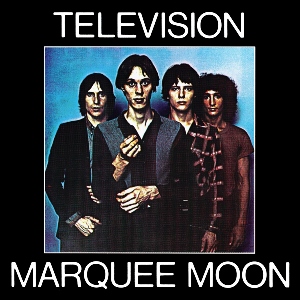
Marquee Moon is the debut album by American rock band Television. It was released on February 8, 1977, by Elektra Records. In the years leading up to the album, Television had become a prominent act on the New York music scene and generated interest from a number of record labels, eventually signing a record deal with Elektra. The group rehearsed extensively in preparation for Marquee Moon before recording it at A & R Recording in September 1976. It was produced by the band's frontman Tom Verlaine and sound engineer Andy Johns.
The Heartbreakers, sometimes referred to as Johnny Thunders and the Heartbreakers, were an American punk rock band formed in New York City in 1975. The band spearheaded the first wave of punk rock.

Sandinista! is the fourth studio album by the English punk rock band the Clash. It was released on 12 December 1980 as a triple album containing 36 tracks, with 6 songs on each side. It crosses various genres including funk, reggae, jazz, gospel, rockabilly, folk, dub, rhythm and blues, calypso, disco, and rap. For the first time, the band's songs were credited to the Clash as a group, rather than to Joe Strummer and Mick Jones. The band agreed to a decrease in album royalties in order to release the 3-LP at a low price.
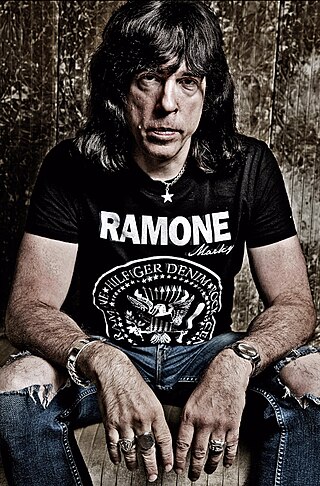
Marc Steven Bell is an American drummer. He began playing in hard rock bands in the New York City area, notably Dust and Estus. He was asked to drum for punk rock band Richard Hell and the Voidoids. He replaced drummer Tommy Ramone in the Ramones in 1978, and went by the stage name Marky Ramone from then on. He has also played drums for other punk rock and heavy metal bands, including his own band Marky Ramone and the Intruders. He continues to keep the Ramones legacy alive around the world with his band Marky Ramone's Blitzkrieg.
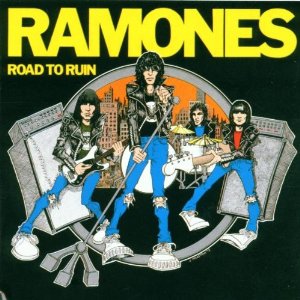
Road to Ruin is the fourth studio album by the American punk rock band Ramones, released on September 22, 1978, through Sire Records as LP record, 8 track cartridge & audio cassette. It was the first Ramones album to feature new drummer Marky Ramone, who replaced Tommy Ramone. Tommy left the band due to low sales of previous albums as well as stress he experienced while touring; however, he stayed with the band to produce the album with Ed Stasium. The artwork's concept was designed by Ramones fan Gus MacDonald and later modified by John Holmstrom to include Marky instead of Tommy.

Ivan Julian is a guitarist, singer-songwriter, and founding member of Richard Hell and the Voidoids and Lovelies. He has also performed with The Isley Brothers, The Clash, Matthew Sweet, The Bongos, Richard Barone, and Shriekback, Jeremy Toback.
The Neon Boys were a short lived New York City proto-punk band, composed of Tom Verlaine, Richard Hell and Billy Ficca. The trio later went on to form the influential rock band Television in 1973; Richard Hell also went on to form the influential punk bands the Heartbreakers and Richard Hell and the Voidoids.

Destiny Street is the second and final studio album by American punk band Richard Hell and the Voidoids. It was released in 1982 by record label Red Star.

"Blank Generation" is the title track of Richard Hell and the Voidoids' 1977 debut album Blank Generation. A rewrite of Bob McFadden and Rod McKuen's 1959 record "The Beat Generation", Richard Hell wrote the new lyrics during his time with the band Television, and performed it live with another band, The Heartbreakers. Malcolm McLaren claimed that the Sex Pistols' song "Pretty Vacant" was directly inspired by "Blank Generation".
William Terry Ork was an American band manager and record producer for the new wave/punk music scene in New York City in the mid 1970s. Ork is associated with the success of the club CBGB as manager for punk band Television and musician Richard Hell. Ork arrived in New York City in the late 1960s and worked briefly for Andy Warhol's Interview magazine. While working as the manager of a film bookstore called Cinemabilia, Ork met Billy Ficca, Tom Verlaine and Hell of the Neon Boys and introduced them to Richard Lloyd. Ork began managing the new band when they reformed as Television. In 1975, he founded Ork Records, which released Television's Little Johnny Jewel (1975), Richard Hell's Blank Generation, The Marbles' Red Light (1979), Mick Farren's Lost Johnny, and the double A-side single Girl and Everytime I Close My Eyes by Prix, among other recordings. Farren said, "Terry Ork was an idealist, as true to the punk ethic as you could be, which means that when it all started getting slick, and the bands were getting deals, Terry was left behind." He died in San Diego on October 20, 2004.
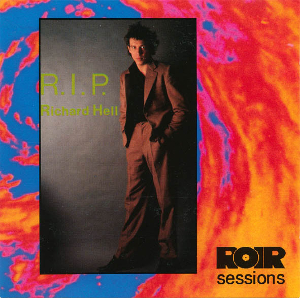
R.I.P. is a compilation album by the American musician Richard Hell, released in 1984. It was originally released in cassette format, and was rereleased in 1990 with different artwork. The compilation includes songs by the Hell-fronted bands the Heartbreakers and the Voidoids, as well as songs credited to Hell. It contains demo, live, and studio recordings. R.I.P. was a "farewell" album, as Hell wanted to leave music in order to do more writing.



